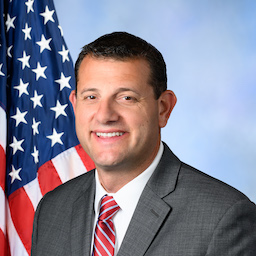- Home
- About
-
Services
- Art Competition
- Community Project Funding Map
- Congressional App Contest
- Congressional Certificate
- Event Request
- Flag Request
- Grants
- Grant Letters of Support
- Help with a Federal Agency
- Inauguration
- Internships
- Kids Page
- Meeting Request
- Service Academy Nominations
- Tour Requests
- Vietnam Veteran Commemoration
- Government Shutdown FAQ
- Issues
- Media
- Contact

Press Releases
House Passes Congressman Valadao's Romance Scam Prevention Act
Washington,
June 23, 2025
|
Paige Ash
Today, the House of Representatives unanimously passed H.R. 2481, the Romance Scam Prevention Act.
WASHINGTON – Today, the House of Representatives unanimously passed H.R. 2481, the Romance Scam Prevention Act. Congressman David Valadao (CA-22) introduced the bipartisan legislation in April alongside Reps. Brittany Pettersen (CO-07), Tom Suozzi (NY-03), and Craig Goldman (TX-12). This bill would require dating apps and services to issue fraud ban notifications to users who have interacted with a person removed from the app for fraudulent activity. Senators Marsha Blackburn (R-TN) and John Hickenlooper (D-CO) introduced the companion bill in the Senate, which passed out of the Senate Committee on Commerce, Science, and Transportation on March 12, 2025. “Millions of Americans use online dating platforms to connect with romantic partners, but unfortunately, they’ve also become a way for scammers to target and exploit unsuspecting victims,” said Congressman Valadao. “As criminals become more sophisticated, it’s important we have safeguards in place to protect users. The Romance Scam Prevention Act is a bipartisan effort to enhance online safety and combat financial fraud, and I look forward to working with my Senate colleagues to get this bill across the finish line.” “Online dating services are being used as a platform for bad actors to target and exploit individuals, yet protections continue to lag behind,” said Rep. Pettersen. “Notifying users if they have been in contact with a potential scammer is a basic security feature that every online dating service should provide. This bipartisan bill will help reduce online crime and keep people safe from online scammers. I’m grateful this legislation has passed the House with bipartisan support, and I will keep working to see it signed into law.” “These aren’t just creepy or shady tactics—they are life-ruining attacks that disproportionately target the elderly, as well as young men and women,” said Rep. Suozzi. “As a father, a former mayor and as a member of Congress, I’ll never stop fighting to protect people from exploitation—online or anywhere else.” Congressman Valadao spoke on the House Floor during debate on the legislation. Watch his remarks here or read as prepared below: Mr. Speaker, I rise to urge support for my bill, the Romance Scam Prevention Act. Every year, millions of Americans from all ages and backgrounds use dating apps and websites to make connections. For many, online dating has made it easier to build relationships, but unfortunately there are countless stories of criminals using these sites for fraudulent activity. While it’s sadly common to see users lie about things like their age or occupation, romance scammers use fake profiles to develop connections and emotionally or financially exploit unsuspecting users. According to the Federal Trade Commission, Americans lost over $1.1 billion in 2023 alone, with senior citizens being the most at-risk age group. There have been countless stories of people being conned out of their entire life savings, all because they believed they had found love online. People who meet online often take their conversations to other communication platforms and might not know they are talking to someone who has been removed. This bill requires dating platforms to issue fraud ban notifications to users who have interacted with an account who has been removed for fraudulent activity. As criminals are becoming more sophisticated when it comes to exploiting victims online, it’s time to put safeguards in place to protect users from financial fraud. I want to thank Chairman Guthrie and his staff at the Committee on Energy & Commerce for their work on this important bill as well as my co-leads, Reps. Brittany Pettersen, Tom Suozzi, and Craig Goldman. Thank you, and I yield back. Background: Over 60 million Americans used an online dating service in 2023, and the Federal Trade Commission (FTC) reported that romance scams resulted in victims losing over $1.1 billion. Criminals use false names and stories to lure individuals into conversation before manipulating them to give up sensitive information. When an online dating service provider becomes aware of a user committing fraudulent activity, like illegally obtaining money, the online dating service provider immediately deactivates the fraudulent user’s account. However, individuals who meet online often take their conversations to other communication platforms, so even when a fraudulent account is removed, an individual might not know they are still communicating with someone who was banned from the platform. Read the full bill here.
|

